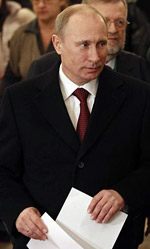During these days the society of Armenia was following the election of the Russian president. They were no less curious about the Russian elections than in their own president’s elections. It is not a secret that elections and political processes in Russia are directly connected with similar processes in Armenia. The reason that Armenians are curious about processes in Russia is not psychological. There are other realistic reasons for that too. During these days experts and politicians are trying to find reasons for this fact and many of them brought reasons concerning geopolitical issues (Russia’s role in the region and the influence of their policy), the conflict of Karabakh and even inner political issues (for example, some of them connected Putin’s election with the possible return of Kocharyan to active politics). However, Armenians do not go in details concerning processes in Russia because mostly they are interested in economic and personal issues first of all. First of all people worry about financial transfers they receive from their relatives living in Russia.
According to the information of the Central Bank, in 2011 the financial transfers to physical persons for non-commercial purposes amounted 1,547 billion dollars. Most of this money came from Russia (1,295 billion, which is equal to 84% of the entire sum of such transfers).
In order to understand what this means in the entire financial situation of the country. The gross consumption on the part of families during one year is 1.5 trillion drams (4-4.2 billion dollars). This means that 30% of the domestic consumption is provided by a third country. It does not matter how close this friendship of the two countries is, it is very dangerous because politics is not about friendship but interests. During 2005-2011 the physical persons of Armenia have received 8,633 billion dollars from abroad, most of which was again sent from Russia. This amount of money has vital significance for families, thus many families are concerned about the source of their incomes. People usually refer to the history and experience when discussing different candidates, For example, in 200 the Russian budget had a lot of financial inflow due to the increase of the prices for energetic resources, thus they increased pensions and social expenses as well. People connect this success with Putin because it happened during his tenure. Even though Putin’s election is a drawback of democracy, many people in Armenia are happy for this because they feel safe.
The Russians (not the Russian authorities) are not following the electoral processes in Armenia with attention too. The reason is that they do not depend on Armenia. By the way, having this statistics in mind many people do not believe that Armenia may ever give up on Russia and be more integrated with Europe. Before the elections in Russia there were people who hoped that something would change at least in Russia and we would become closer to Europe together with Russia, after these elections these hopes ended up too. There was a joke that in fact Armenia’s president is Putin because there are more Armenians in Russia than in Armenia itself. However, the role of migrants and financial transfers from Russia should not be exaggerated. Let’s refer to the example of Georgia. According to different sources, the number of Georgians officially registered for residence in Russia is 200,000, but the fact is that the number of Georgians living and working in Russia is 500,000-1,000,000. Certainly they transfer money to their families too. According to the national bank of Georgia, in 2011 the financial transfers to Georgia amounted 1,268 billion dollars, 60% out of which came from Russia. For a small economy this is a huge share, which could be used as a tool for certain purposes. However, Georgians do not worry about it. However, Georgians do not care about it. On the one hand, they are moving toward Europe closer and closer, and on the other hand, the amounts of financial transfers from Russia to their country continue to grow.

